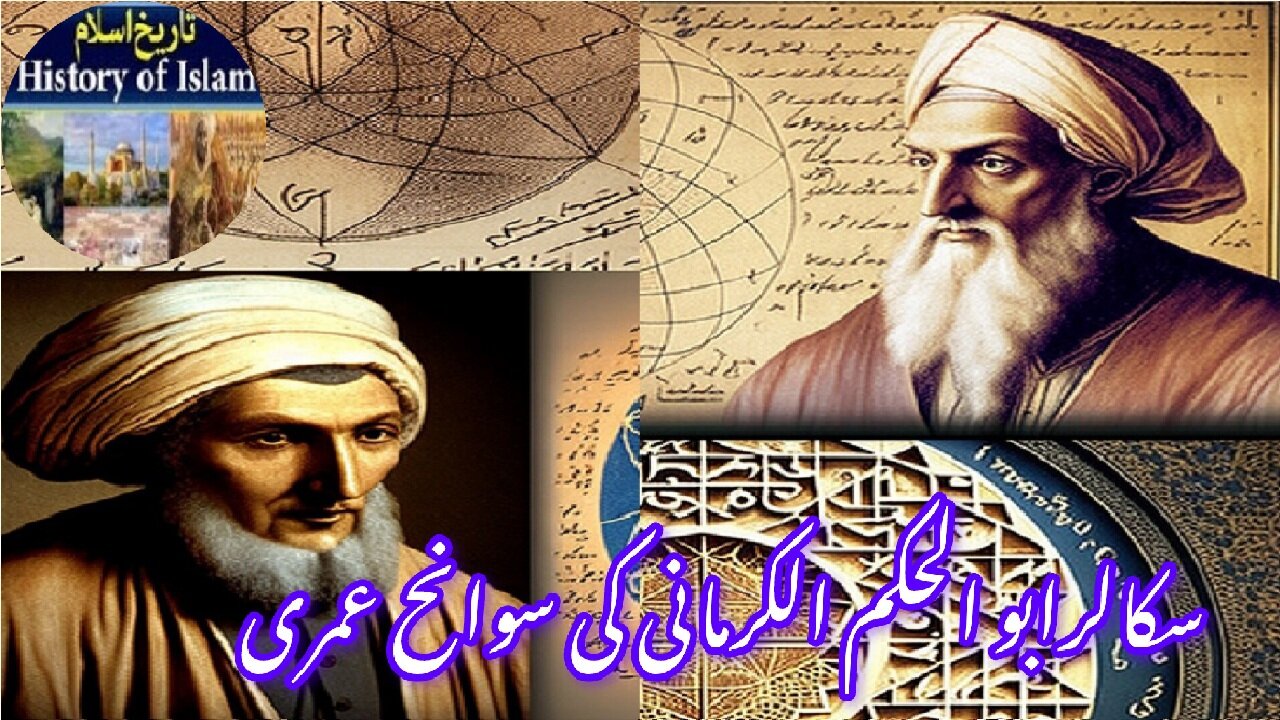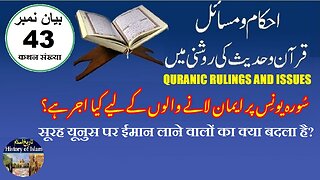Premium Only Content

Biography of Abu al-Hikam al-Kirmani अबू अल-हिकम अल-किरमानी سوانح ابو الحکم الکرمانی
@islamichistory813 #abualhakamalkirmani #biography #heritage #islamichistory #islamicscholars #islam #history #scholars #hadith #quran #sunnah #islamic #legacy #wisdom #fiqh #knowledge #tafsir #faith #guidance #islamicworld #muslim #islamiclegacy #imams #islamiccivilization #goldenage #truth #ummah
Biography of Abu al-Hikam al-Kirmani
Asslamoalaikum, We welcome you in our series Muslim Heritage and Islamic Scholars, today we will describe Biography of Abu al-Hikam al-Kirmani
Abu al-Hikam al-Kirmani was a prominent Muslim philosopher, scholar, and polymath of Al-Andalus, remembered for his profound intellectual contributions to the flourishing period of Islamic Spain. He was born in Cordoba, Al-Andalus, around 970 CE (359 AH), during the reign of the Umayyad Caliphate of Cordoba. Cordoba was one of the most developed cities in the world at the time, with extensive libraries, universities, and educational centers. This rich intellectual environment shaped Al-Kirmani's early life, which devoted itself to philosophy, theology, mathematics, and the sciences. His name "al-Kirmani" suggests that his family originated in Kirman, Persia, but he himself was a native of Andalusia.
Al-Kirmani grew up at a time when philosophy and the rational sciences were being widely studied in the Islamic world, especially through translations of Greek works. He was greatly influenced by Neoplatonism and the thought of Aristotle and connected them to Islamic theology and spirituality. His writings explored the harmony between philosophy and religion, making him a key figure in introducing philosophical reasoning to Andalusia. Among his notable works were his contributions to the study of geometry, astronomy, and metaphysics, which were important in the Islamic intellectual tradition. He was respected not only as a philosopher but also as a religious thinker who sought to reconcile reason with revelation.
Al-Kirmani lived through a turbulent period in history. The decline of the Umayyad Caliphate of Cordoba and the rise of rival tribal kingdoms created both opportunities and challenges for scholars. Despite political instability, he continued to teach and write, and attracted students and admirers who carried on his intellectual legacy. He was known for his simplicity, deep spirituality, and commitment to knowledge, which earned him respect among rulers, scholars, and the common people alike.
He died in 1066 CE (458 AH) in Cordoba, Al-Andalus. His death marked the end of an important period in Andalusian philosophy, as he was among the last generation of great thinkers before the arrival of giants like Ibn Rushd (Urwais) and Ibn Tufail. Al-Kirmani was buried in Cordoba, the city of his birth and the center of Andalusian learning.
Regarding his tomb, historical records indicate that Al-Kirmani's tomb became a place of quiet veneration among scholars and admirers of philosophy. Unlike some Islamic scholars who were widely venerated as saints, al-Kirmani was primarily remembered in intellectual circles. However, his burial in Córdoba stood as a reminder of the city's golden age. Over the centuries, Córdoba underwent many changes—from Muslim to Christian rule—that transformed the landscape of Islamic shrines and cemeteries. Although the exact status of al-Kirmani's shrine today is uncertain, it is known that in later centuries scholars acknowledged his contributions and visited Córdoba to honor the legacy of figures like him who shaped Andalusian thought.
Abu al-Hakam al-Kirmani's legacy lies in his role as one of the earliest Andalusian scholars deeply involved in philosophy. His efforts paved the way for future thinkers of Islamic Spain who would later achieve international fame for their synthesis of philosophy, science, and religion. His ability to balance **intellectual inquiry and faith** marked him as a pioneer of intellectual thought in Andalusia. In the broader history of Islamic scholarship, al-Kirmani captures the spirit of Cordoba at its peak—a city where the knowledge of the East and the West came together to make some of the most remarkable advances in human history.
Even today, al-Kirmani is remembered as a scholar who dedicated his life to knowledge, a philosopher who explored the mysteries of the universe, and a believer who sought harmony between reason and revelation. His shrine in Cordoba remains a symbolic reminder of the city’s illustrious past and the legacy of scholars who shaped the Islamic Golden Age.
With this, we ask for your permission until tomorrow and tomorrow we will narrate biography of Abu Bakr Muhammad ibn Khair . we will also narrate the history of her shrine. Finally, we pray to Allah Almighty to grant us the ability to act on the Quran and Hadith, Amen.
Allah Hafiz
==================================
-
 8:45
8:45
ISLAMIC HISTORY
23 hours agoWhat is the reward for those who believe سورہ یونس پر ایمان لانے والوں کے لیے کیا اجر ہے؟
1 -
 LIVE
LIVE
Midnight In The Mountains™
1 hour agoMorning Coffee w/ Midnight & The Early Birds | Musks Starlink Falling from Heaven... Internet Heaven
60 watching -

PudgeTV
1 hour ago🔴 The Forever Winter | The 3 Rumskateers Adventure into Darkness
5 -
 31:05
31:05
Liberty Hangout
1 day agoAnti-Fascists Can't Define Fascism
130K160 -
 2:35:27
2:35:27
FreshandFit
8 hours agoThe Biggest Debt Problem in America
101K15 -
 2:10:56
2:10:56
Inverted World Live
11 hours agoRobot Holocaust | Ep. 123
86.6K15 -
 3:22:33
3:22:33
Laura Loomer
11 hours agoEP149: Trump Frees the Hostages: Will HAMAS Respect the Ceasefire?
70.3K54 -
 1:02:02
1:02:02
The Nick DiPaolo Show Channel
11 hours agoTrump’s Success Rattling Lefties | The Nick Di Paolo Show #1804
43.4K30 -
 2:49:33
2:49:33
TimcastIRL
11 hours agoDemocrat Call On Liberals To 'FORCEFULLY RISE' Against Trump, DHS ATTACKED In Chicago | Timcast IRL
258K122 -
 2:50:07
2:50:07
Badlands Media
17 hours agoDEFCON ZERQ Ep. 013: Global Shifts, Spiritual Warfare, and the Return to Source
76.4K82